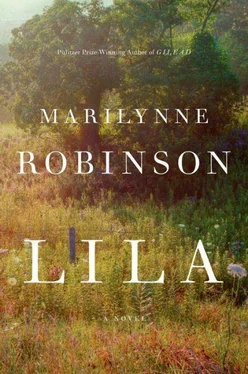By then she was helping Doll, not being taken care of by her, and that was one of the reasons Doll wanted to be rid of her. Poor child, she would say. She had to lean on Lila’s arm just to walk up a rise in the road. She couldn’t do any heavy work at all. There was no strength left in her. So she was anxious to get the girl settled somehow, before the things could happen that did happen.
I’m a decent man. The Reverend could have said the same thing to her. Not because she was young anymore but because she was rough and ignorant. And then what would she have done? What could have made her take such a chance? Sometimes she thought she wanted the worst thing to come finally, a shame that would kill her. Why else did she say, You ought to marry me? Did she think he would laugh? Maybe she didn’t want him to say, I will. She never thought he would. She didn’t believe him when he did. Maybe she meant to go back to that leaky old cabin and feel ache and sting down to her bones and nothing else. To put everything else away from her, because that ache was, first and last, where she came from and what waited for her. Maybe she slipped into his bed to see if she really was the wife of this decent man, not just a stray he had taken in out of pity. And now she had this belly, and he was always at her elbow saying, This is my wife, this is Lila, my wife. You see, Doll, I did what you said. So many times she had thought, if she had just said a word to that old man, if she hadn’t stood there staring at his boots, Doll could have stayed somewhere nearby, and Lila would have taken food to her and made sure she was warm, sneaking out at night to find her. They’d have laughed with the pleasure of the secret.
The Reverend let her think her thoughts, waiting until she looked up from them to speak. He said, “You still don’t trust me at all.”
And she said, “No. Can’t really say that I do. No reason you should trust me, either. There are things I ain’t told you.”
He nodded. “I know. Maybe you should just tell me those things, whatever they are, and you’d see that I didn’t care about them, and then you could trust me.”
She said, “Not till I get this baby born.”
He laughed and put his arm around her. “Well, isn’t it a beautiful evening? Hardly a cloud. Are you warm enough?” He took off his jacket and put it over her shoulders. “We might not be having many more warm nights.” Then he said, “‘The heavens declare the glory of God; and the firmament showeth his handiwork. Day unto day uttereth speech, and night unto night showeth knowledge.’”
“I guess that’s the Bible.” When he was happy he was always saying something from the Bible.
“Psalm 19. ‘There is no speech nor language; their voice is not heard.’”
“That’s another thing I don’t understand.”
“Maybe nobody does, entirely. But it’s beautiful.”
Pretty nearly anybody must understand more than she did. She said, “What is the firmament?” It was easier to ask questions, walking along in the dark like that, her arm in his, in the warmth of his old black coat, his preacher coat.
“The sky the way it looks to us. As if there were something like a dome over us, like a glass bowl turned over—”
She thought, Then I guess there ain’t. He told her that the moon is much closer than the sun, falling stars aren’t really stars. She and Mellie had wondered about those things, why some stars came unstuck and the others didn’t, where they landed when they fell, whether all of them would fall down sometime, even the moon. It was nice to be talking about the stars. She could hardly think of them apart from the sound of cicadas and the smell of damp and clover, whispering with Mellie because they should have been asleep. Children come up with these notions, and then after a while they forget to wonder about it all, because what does it matter, what does it have to do with them, things are what they are. So the only ideas she had were a child’s ideas, and she knew how they would sound to him. He’d try not to smile, and his voice would be very kind. But he seemed to know she had to be told everything, that she wouldn’t know what to ask. The earth goes around the sun. It spins and it tips. All right.
Once, when she was new at the school in Tammany, the teacher asked her what country they lived in. The corn was tall, the sun was hot, the river was high for that time of year, so she said, “Looks to me like pretty decent country.” That is what Doane would have said about it. And the children laughed, and some of them leaned out of their desks to wave their arms, and they whispered the answer loud enough that the teacher would hear even if she didn’t call on them. “The United States of America!” Yes, the teacher said, the United States. What state? What county? And Tammany was an Indian chief who was kind to William Penn. Every day Lila stood off by herself during recess and lunch, but that day the teacher asked her to stay in to help her clean the blackboards, so she wouldn’t be teased, probably. She said, “You mustn’t be sad over a little thing like that, Lila. You’ll catch up soon enough.”
Lila said, “Don’t seem like it. Maybe I won’t. Maybe I don’t even want to.”
And the teacher said, “Well, I want you to. And I’m going to see to it.”
The teacher was just a girl herself, a gentle girl. She helped Lila read and write, add and subtract, the things she would most need to be able to do, because Lila was the kind of child who would leave school the minute she could, or the minute her mother decided she had to. The teacher let Lila stay in the classroom working on her spelling and numbers when the other children played outside. She was glad to be by herself with something to do. She hated the other children because they had laughed at her, because they were town children, because she would never stay there anyway and they knew it. The teacher said she was a bright girl, and called on her to spell words or do sums in front of the class as soon as she knew Lila would probably get the right answers. That was all that made her bother learning them, but it made her like learning them because she was good at it. At the front of the room there was a map of the United States of America. A painting of George Washington. A flag with forty-eight stars and thirteen stripes. These things had a kind of importance about them that Lila had never even heard of before. She’d thought the world was just hayfields and cornfields and bean fields and apple orchards. The people who owned them and the people who didn’t. And towns. Doll wanted to give her another kind of life. She didn’t know how to go about it, rough and ignorant as she was, but she did try.
She heard herself say, “There was a woman who took care of me. She wanted me to marry an old man. But I couldn’t. A young girl just has other ideas. She told me there wasn’t no more for me to expect.”
He said nothing. They walked the rest of the way home, neither speaking a word. She felt the old loneliness seize on her from one heartbeat to the next, the old, hard awkwardness of her body. How could a child stay alive in a body that felt so dead? Best that it shouldn’t. There was no place for her to be alone now except in his house. She would leave the next morning, before he was awake, before it was light. There was nothing left in that cabin. She’d take a blanket off her bed, and a kitchen knife. Maybe her money was still out there where she hid it.
He opened the door for her and switched on the light. His face was slack and his lips were pale. He took the coat from her shoulders and hung it up. Then he just stood and looked at her. He said, “I’m at a loss. But you’re right.” His voice broke, so he cleared his throat. “You should stay here until the baby comes. After that, of course, you can do whatever you think is best.”
Читать дальше












